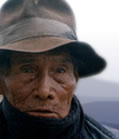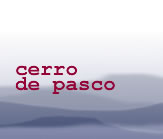 |
 |
||
 |
|||
|
RELATED THEMES compensation environment land politics OTHER LOCAL THEMES BACKGROUND |
justice and crime
There is little talk of crime apart from some animal theft, although there are references to robbery and violence in the big cities, which are generally seen as more dangerous. Some narrators describe the old systems of community justice, and how effective social sanction was in ensuring everyone maintained such traditions such faenas (communal work). The authority of the community is still powerful. One narrator (Peru 3) describes his role as justice of the peace: "[I'm] nominated by my people. to administer justice [for example] when there are problems with neighbours, when there are disputes, fights and things like that. [In the past justice was administered] through the community authorities: the president, with the most authority, and his governing body decided on such cases. Now it's the justice of the peace." His point is that: "Whichever way you look at it, the community is the most important level of authority for the Quiulacochans. A real Quiulacochan must respect the community agreements, the laws of the community which are the highest command." There is considerable mention of law suits and legal battles - mainly for compensation and for land rights, but also for better working conditions in the mines and for pollution controls. There's a strong sense that the mining companies made full use of their superior resources: "by taking advantage of the fact that the comuneros of old knew nothing about the law, or by making up the mining legislation [as they went along] they took away lands from the communities for mining" (Peru 1). The same man, who became a union official, describes how in order to get justice for the mineworkers, he had to master the relevant laws: ".throughout Cerro de Pasco there was - and still there is - inequality in the way miners were.treated. I ask myself why these differences exist when the law states equal rights, equal work, equal earnings, equal remuneration. So I got things standardised. To achieve this not I not only had to take advantage of trade union strike legislation, but I had to get involved in the legal mechanics of the movement." The big landowners and companies didn't always win in the courts. One man (Peru 19) tells a story of a small community of only 11 farmers who were forced to leave their land "when the smoke damaged the grass and the livestock was affected. Afterwards, after some years, a group of 12 comuneros returned to Paccha [and found] other haciendas that bordered Paccha had invaded the land of the community. by then most of Paccha had been usurped by the haciendas. [The comuneros] took them to court. The first trial lasted six years. In 1936 they won the case and recuperated their land." quotes about justice and crime"In the city, nobody knows anyone, they live fast and don't help each other, there's lots of crime and delinquency. Life's very expensive and what you earn isn't enough to live on. Here it's different. Although there are some selfish people around here.there's more solidarity, friendliness, people help each other." ".they say the Cerro de Pasco Corporation bought the estate from us and so the problem has been solved. It's a trick argument, a lawyers' argument. If the company had really given us what they were supposed to give us things would have been different. Moreover, it's a lie that Centromín doesn't harm us any more, they're still polluting and they still affect us. Of course they can abuse us because they have power and because we're not as well versed in legal issues as they are, sometimes we fall into their lawyers' traps and with all that documentation." ".life as a labour union member changed my life. it was that activity that stopped me from handing in my notice as I had planned. You can say that it gave my life a bit of different meaning and also I learned about a lot of things. My work-mates would come and ask me for advice, I learned how to help them by advising them on legal issues, occupational hazards and about other things I had picked up from the lawyers that helped us. When I was sacked by Centromin, lots of other national labour union leaders were sacked as well. by sacking the leaders they thought they could behead the movement, but it wasn't like that because the struggle continued. Later the violence we all know - death, disappearance of union leaders - came." |
|